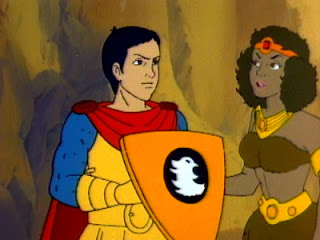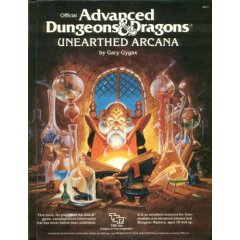 |
Today, we go behind the
curtain on my style of play.
|
I ran e1 AD&D for as many as 12 players back in the day.
Needless to say, a lot of trouble popped up at the table due to a large number of players. The obvious and primary problem was attendance. My way of dealing with this was not to run dungeons all the time and encourage the party to exit a dungeon whenever possible. That at least opened the possibility of missing players' characters being left behind in a place of safety. It didn't always work out, but it significantly reduced the possibility of myself or someone else running an extra character. Wilderness and town settings are best for depositing a PC in a safe place.
My "solution" was less than ideal. I would run the character in the background as an NPC and adjusted threats accordingly. It was rarely a good idea, but its what I did.
The next major issue was the introduction of Unearthed Arcana to our campaign. I personally love the book, but I can count on one hand the number of times someone decided to be a Barbarian, Cavalier, or Theif-Acrobat. My players were far more interested in the new racial subtypes, spells, and weapons that were never a problem. The details in this tome are far more helpful than the mechanical changes.
One thing I flat-out ignored was Fighter, Ranger, or Paladin as a subtype of Cavalier. No character class was a subtype of any other class in my campaigns. What helped in this regard is that I used to play B/X and let players use B/X characters in AD&D. You could be an Elf, a Fighter who was an elf, or whatever else was described in either set of rules. B/X characters tend to have lower stats, but when you're the DM who imposed the rule, you know that already and adjust accordingly.
Cavaliers have so many new mechanics that are horrible for gameplay. Abilities or new mechanics based on alignment suck because that is the domain of Paladins or Assassins. It is too wild and inconsistent for players to remember. Starting at level 0 for one specific class is stupid. Tacking on a paragraph to the Cantrip descriptions kind of implies that Magic-Users and maybe Illusionists also start at level 0.
Why not every character? Because it's stupid and adds nothing. Just weaken the party with a disease at level one if you want that. Worse, this book also lead to the idea that Magic-Users might have had three levels of level 0. It wasn't all that clear.
What the hell? All I wanted from this book was to have Eric, Bobby, and Diana from the cartoon, not a tax audit form and root canal.
To get around this, I completely eliminated the concept of level zero. In discussing this with the players, they all wanted that little bit of padding for their Hit Points at level 1. Ok, sure. What I wanted was a simple ruleset and a Cavalier that behaved more like a non-lawful good Paladin.
I created a collection of "professional classes" which imparted a backstory, a field of special knowledge, and 1d6 HP to any player character class. There was also a slight chance that someone received a +1 with a tool-like weapon or the ability to wield a different type of weapon in lieu of a single weapon normally assigned by the main character class description. For example, a mason-turned Cleric received a +1 to hit with a hammer or a hunter-turned Magic-User knew how to use a lasso or perhaps a light spear instead of a quarterstaff.
I even wrote a book about it called Zero to Hero: Uncommon Commoners. The "Zero" in the title secretly refers to my "no zero-level characters" edict. This is a trivia-like spoiler. No place in this title do I suggest to the reader not to use zero-level characters. Since I want to rewrite this book, you might want to wait to download it.
My campaigns tended to be high magic, so tacking on a few extra HP to every character did nothing special, except weaken spell casters. The deal for spell casters was also more power, I permitted first-level characters access to their bonus spells right out of the gate. In my campaigns, a super wise Cleric could unleash an extra, higher-level spell at first level. I also used the same chart for Magic-Users, Illusionists, and Druids.
Who cares?
I gave every PC Fighting man an extra 1d6 HP. Let the power rush to everyone's head while guiding the squishy magic-using types away from florentine style dagger fights which ends them so quickly.
One tale of woe stands out in my head. A case of pigheadedly ignoring mechanics. A player was having a difficult real-life and decided to burden me with his troubles by lashing out with a Paladin that wouldn't stick to his alignment. The rule on this is pretty simple. The Paladin loses their abilities and some experience until they conform to the class requirements or changes class and/or alignment.
The reason for this rule is simple, to prevent mechanical abuse.
As you can see, I play pretty fast and loose with mechanics anyway. I couldn't let the abuse continue but I didn't feel like removing powers from someone who was already suffering from a real-life loss. It was the wrong answer.
When the first couple of abuses happened, I merely told the player that his character felt different about his chosen class. I didn't have an instant solution on the spot. When it happened in the next session, I addressed it in the same way. By the third session of abuse, I was ready to unload on him.
And boy, did I.
Instead of striping the Paladin of their powers, I assigned him an invisible angel NPC. Only his character
 |
| Cavaliers are dicks... and awesome. |
saw it and heard it. I had a series of notes preplanned to handle many eventualities. The angel was not much of a burden, but was not especially helpful.
The other player and characters glommed on to the fact that either the player or the Paladin was going nuts or really did have an invisible friend, but what it was exactly was a mystery.
At first, I dealt with things by having him read sections of the gamebooks. Deities and Demigods - about his chosen god in particular. This seemed to reduce the amount of abuse by a good bit. Rather than engaging me in a challenging fashion, he was engaging with an NPC who operated under very strange rules that he didn't know. It's hard to violate rules you don't know.
One huge problem was when the Paladin lost his warhorse. It was shot right out from under him and died. The hostile behaviors came right back until the player realized I already had a plan for this possibility. Initially, I provided a regular horse and a few strange, mystical events to set the player back and stand the character back up for the win. A Paladin without a steed is at a disadvantage. The rest of the party either had to accept these mystical events or guard him against himself.
At various points, a stag, a dog, a cat appeared to assist him when needed. The angel confirmed that this was his God softening the blow and putting him on the right course to find a new warhorse.
Amusingly, the player tried to suss out the exact rules I was using for providing animal guardians. He entered a cattle pen during combat, only to have the angel proclaim:
"These are normal cows, son. This isn't how we should end."
Ironically, the warhorse problem resolved itself when the Paladin had it resurrected via a wish spell meant to rescue a different party member. Amazingly, the Paladin wrote out a wish that fulfilled both issues, that was also not abusive and seemed very sincere. As a Paladian would, the player ascribed the wish to his diety and pleaded for his horse and teammate's lives.
Some of these ideas I cribbed from Infocom games. Not the details, but the humorous tone the games used to get the player off the wrong track. Other times they inspired spur-of-the-moment gambits. More than a few scenarios came from fantasy novels, like the Damiano series. But the best one was preplanned from the get-go of deciding how to deal with this troublesome player.
For example, lot of people play AD&D with the idea players don't die at 0 HP, they slowly fall to -10 before expiring. I decided to mess with this idea. When the Paladin, who already had a lot of HP to begin with, dropped to 9 or fewer hit points, his guardian angel intervened. The angel would envelop the Paladin with his wings and at the end of the round, would physically merge with him. The Paladin would have access to flight and two flaming scimitars, but his hit points were still at 9 or less and dropping one point per round like a character at 0 HP.
Tick-tick-tick...
It took a year for this eventuality to happen. That's 52 weekly sessions where I needed "A PLAN". Real-life losses hang around for a good bit, so having "A PLAN" for the table is helpful. Hopefully, it doesn't involve kicking someone out of the game.
(Although, that can be a plan, too. You should approach this like ending a marriage, with or without children. Because other players may act like children. Don't do it lightly. )
After dozens of sessions, most of the party realized that there was something strange about the situation. When the angel finally revealed itself, the party cheered. There were half a dozen mock, "I knew it!" exclamations and applause. They really enjoyed the reveal.
The important bit here is creating a bit of mystery and investment for the other people at the table. Otherwise, it smacks favoritism and Mary-Sue'ing. One portion of this was explaining the mechanic, not the consequences of the mechanic.
No one, not even the Paladin's player knew what would happen if the combat lasted long enough for him to drop to 0 HP. I didn't state what would happen so as to drag the party into the event. They all needed the combat to end in less than 9 rounds. I didn't say that, but that's how life works. I honestly had no idea what would happen and luckily, the party rose to the challenge and now we'll never know.
While I loved the experience of dealing with this troublesome player in a creative way, I only wish to bring the inspired magic (and maybe an invisible angel) back to my table. Troublesome players are often not fun.
Jeeze. I didn't mean to burn through 2000 words on one tale of table trouble. I have appended the words, "Part 1" to this title as I can see I will be back to discuss other problems another day.






